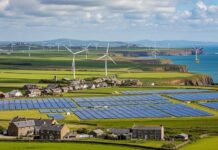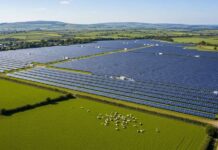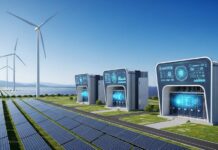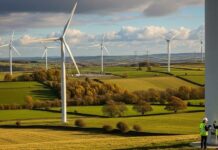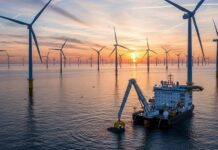EON SE’s plan to spin off its fossil fuel plants marks a watershed moment in Germany’s renewables effort that will likely bolster the country’s already leading position in clean energy.
EON’s announcement is the culmination of a push to wind, solar and other alternative energy forms that the German government began 14 years ago with subsidies to reduce the country’s reliance on fossil fuels for power production. That plan gained added momentum in 2011 with a decision to close the country’s nuclear reactors following the Fukushima accident.
Chancellor Angela Merkel’s bold move is already beginning to pay off, with Europe’s largest economy for the first time getting more electricity from renewables this year than any other source. About a quarter of Germany’s power now comes from green energy, compared with 6.2 percent in the U.S. and 4.8 percent in France.
“We are in the midst of a giant transformation process of our energy system,” Deputy Environment Minister Jochen Flasbarth told reporters yesterday in Berlin. “Renewables are the increasingly dominant factor in the German energy mix. EON’s decision is a piece of the puzzle.”
The government intends to go further, setting goals to increase the use of alternative energy sources to as much as 45 percent of all power generated by 2035 and boost that figure to 80 percent by 2050. Germany, where the eastern countryside is already dotted with thousands of wind turbines, plans to do that in part by expanding large-scale offshore wind plants that can produce more reliably because the breeze is steadier at sea.
Closing Reactors
Merkel decided after the Fukushima accident in Japan to close the country’s eight oldest nuclear reactors and shutter the remainder by 2022. To reach stricter climate protection targets, Germany tomorrow will unveil details of a plan demanding additional emissions cuts from electricity produced using fossil fuel.
“Germany has some of the most ambitious climate protection targets and is radically rebuilding its energy system,” said Sven Diermeier, an analyst at Independent Research GmbH in Frankfurt who follows EON and rival RWE AG. “And now EON is attempting the most radical rebuilding so far of any large European utility.”
Germany’s push has come at a cost for the country’s utilities, energy-intensive industries and consumers. The influx of renewable power on the grid has undermined wholesale prices and decimated the profitability of coal and gas plants. At the same time, the taxes on electricity that subsidize renewable energy production has led to Germany having the second-highest household power prices in the European Union, according to Eurostat.
Subsidies
German consumers have paid a total of 106 billion euros ($132 billion) through the surcharge on their power bills to finance the clean-energy expansion. The annual cost may peak this year and drop slightly to 22 billion euros in 2015 as the government begins reducing subsidies for the industry.
Despite the expense, the shift has broad public support. A poll earlier this year showed 71 percent of Germans back the decision to close the nuclear reactors and 67 percent think the country isn’t doing enough to move to renewables, according to the Allensbach polling company.
Against this general backdrop, power companies in Germany are increasingly staking their future on green energy. EON after the split in 2016 will concentrate on renewables, distribution and marketing to households and consumers. The spun-off entity will include conventional power generation, global energy trading, exploration and production.
Renewables Focus
“There’s a new world becoming reality that’s driven by customers,” EON Chief Executive Officer Johannes Teyssen said today in Berlin of the plan to split the utility.
Vattenfall AB, owned by the Swedish state, wants to get rid of its German coal operations to focus on renewables, while ENBW Energie Baden-Wuerttemberg AG last year doubled its asset sales goal to 3 billion euros to free up cash to invest in clean energy. RWE, Europe’s biggest corporate emitter of greenhouse gases, said yesterday it didn’t plan to follow EON’s lead. RWE last year generated more than half of its power in Germany with lignite, the dirtiest fossil fuel.
“Spinning off coal, gas and oil from the core business is a smart strategy for a future-oriented company,” said Patrick Graichen, head of Agora Energiewende. “I’m sure additional utilities will follow suit — not just in Germany, but worldwide.”
Electric Cars
Merkel is also trying to reduce the country’s emissions by pushing Germany’s auto industry to build more electric cars after French, Japanese and American carmakers got off to an early lead. Including vehicles like Bayerische Motoren Werke AG’s i3 city car and an electric version of Daimler AG’s Smart two-seater, German auto manufacturers will offer 17 electric- powered models by the end of 2014, and another 12 will be going on sale next year, according to the country’s VDA automotive industry group.
The chancellor today threw her support behind incentives to reach her goal of having 1 million electric cars on German roads by 2020. The country is behind on the effort in part because the government has previously balked at subsidies like those offered in France, where consumers receive as much as 6,300 euros to help cover the higher cost of low-emission vehicles. Electric car sales in Germany last year amounted to about 7,600 vehicles, while in France demand was almost double that at 14,400.



